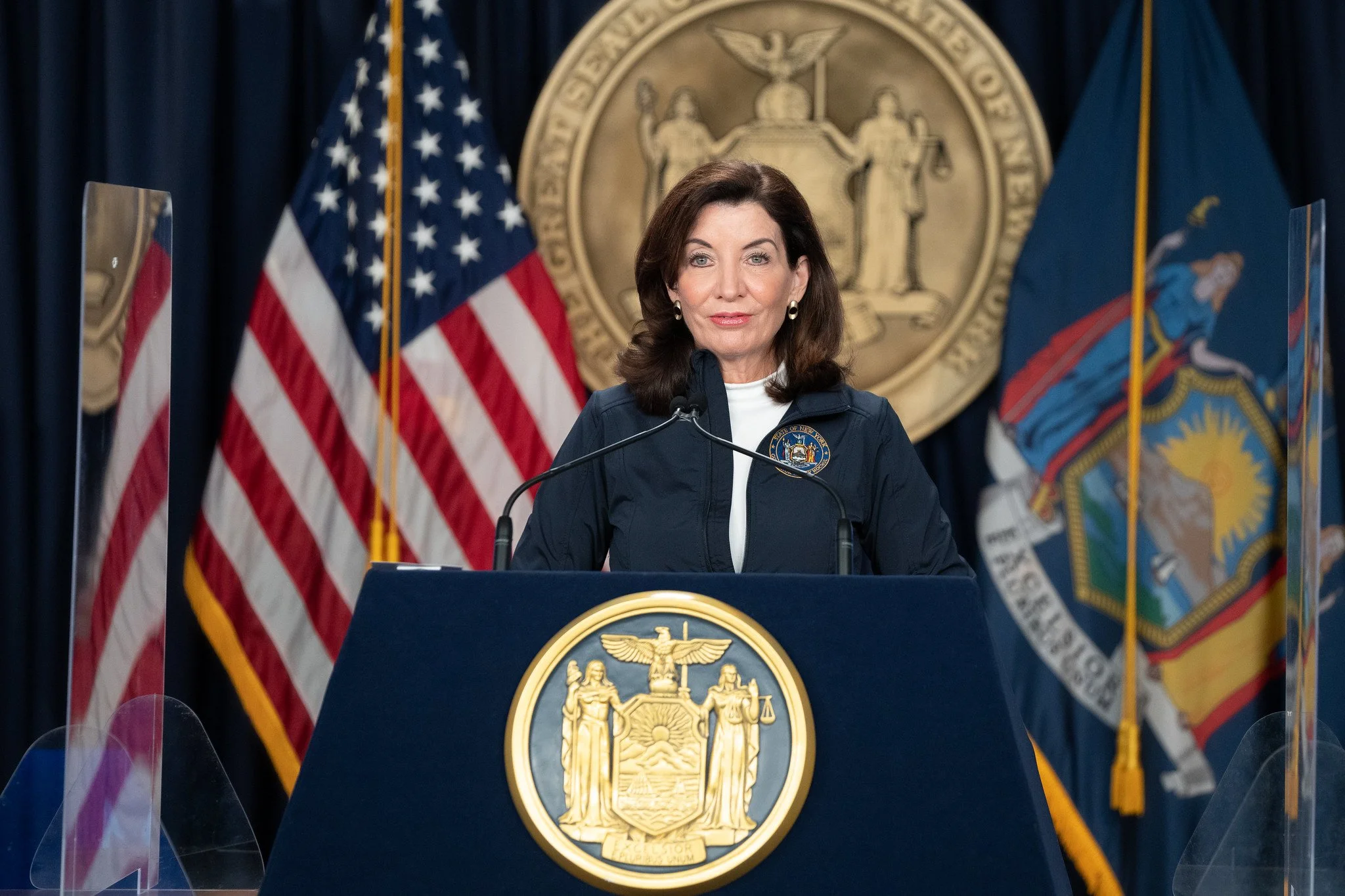Hochul pocket vetos judge recertification bill
/Governor Kathy Hochul pocket vetoed a bill this week that would have made the judge recertification process nearly automatic. Photo via the governor’s office/Flickr
By Jacob Kaye
Despite unanimous support from lawmakers in the State Senate and Assembly, Governor Kathy Hochul pocket vetoed a bill that would have made the judge recertification process in New York nearly automatic.
Hochul had 30 days – not including Sundays – to sign Senate Bill 4379 and its Assembly companion bill, A6044, starting from when the bill was delivered to her desk at the end of December, while the legislature was out of session. The bill would change one word in the state’s judiciary law to make the judge recertification process a near certainty for older judges. By taking no action on the bill during the 30 day period, Hochul allowed it to fail.
Office of Court Administration spokesperson Lucian Chalfen said the OCA was glad to see the bill struck down at the final moment.
“We are pleased that the Governor chose not to sign this bill into law, which would have undermined the Administrative Board’s discretion in the Judicial certification process,” Chalfen said.
“It is bad policy and anytime large institutions are limited in their ability to make decisions based on financial or operational necessities, it hinders performance and has a direct effect on those they serve, in this case all New Yorkers,” he added.
Under state law, Supreme Court justices must apply for recertification and undergo cognitive exams every two years after turning 70 until they reach a mandatory retirement age of 76. OCA administrators are not obligated to grant recertification, even when judges demonstrate their cognition and capability.
The bill was conceived after 46 of 49 judges over the age of 70 applying for recertification in 2020 had their applications denied and were let go. The OCA said the terminations, which included a number of judicial staff members, were necessary to offset a $300 million budget crisis brought on by the pandemic.
Over half a dozen judges in Queens were among those whose applications for recertification were denied.
The state’s judiciary law currently states that judges over 70 years old “may” be recertified if they’re proven to be mentally and physically fit and if there is a need for them on the bench. If the bill had been signed into law, it would be amended to read that judges “shall” be recertified if they meet both qualifications.
It’s unclear why Hochul allowed the bill to fail – it passed in both state houses unanimously. It also had the support of a large swath of legal groups. Over 30 retired Appellate Division judges expressed support for the bill, as well as a handful of retired attorneys, law professors and bar associations, including the Macon B. Allen Black Bar Association, Latino Lawyers Association of Queens County and the New York City Bar Association’s Council on Judicial Administration.
The governor’s office did not respond to multiple requests for comment.
In a joint statement, Judge Barbara Kapnik, the president of the Association of Supreme Court Justices of the State of New York, and Mary Ann Brigantti, the president of the Supreme Court Justices Association of the City of New York, expressed their dismay at the governor’s decision not to sign the bill.
“We are disappointed the Governor did not sign the certification bill, passed unanimously by both houses of the Legislature last year, which would have ensured that what happened in 2020 could not happen again and underscored the importance of the independence of the judiciary,” Kapnik and Brigantti said.
Queens Supreme Court Justice and past president of the Association of Supreme Court Justices of the State of New York Carmen Velasquez said that the governor’s lack of action on the bill was a rejection of the “will of the people.”
“She just ignored the realities of what has been happening,” Velasquez said. “The chief judge thinks that she has unfettered discretion and, in this country, no one has unfettered discretion.”
“I keep trying to understand [Hochul’s] logic – she just failed to do her job,” the judge added. “I feel like it's just a slap in the face of the legislature because this was a unanimous bill.”
One Queens Supreme Court justice who was denied recertification in 2020 and whose name is being withheld for fear of reprisal, believes that Hochul pocket vetoed the bill because she was unsure of its constitutionality. However, the group of judges say the bill actually brings the state’s judiciary law in compliance with its constitution.
“We believe firmly that it is constitutional, that it's right there in the Constitution,” the judge said. “That's all there is.”
The judge added that without protecting older judges, the public looses the value of an experienced judiciary.
“The public is harmed because you don't have the value of that person's experience and history
to continue in the system, because you've made it impossible for them to do so,” the judge said.
Though the bill has failed, the fight over the consequences of the recertification decision continues.
Two lawsuits brought by judges were filed soon after the decision to not recertify was announced in 2020. Though one was dismissed after the OCA successfully argued the suit was moot because the judges had been rehired, the other suit is ongoing.
There’s also the matter of pensions – a number of judges who were denied their application in 2020, began to receive pension payments only to be recertified in early 2021, now owe back the money they received.
The judges will have to begin repaying the funds if and when their two-year term ends.




